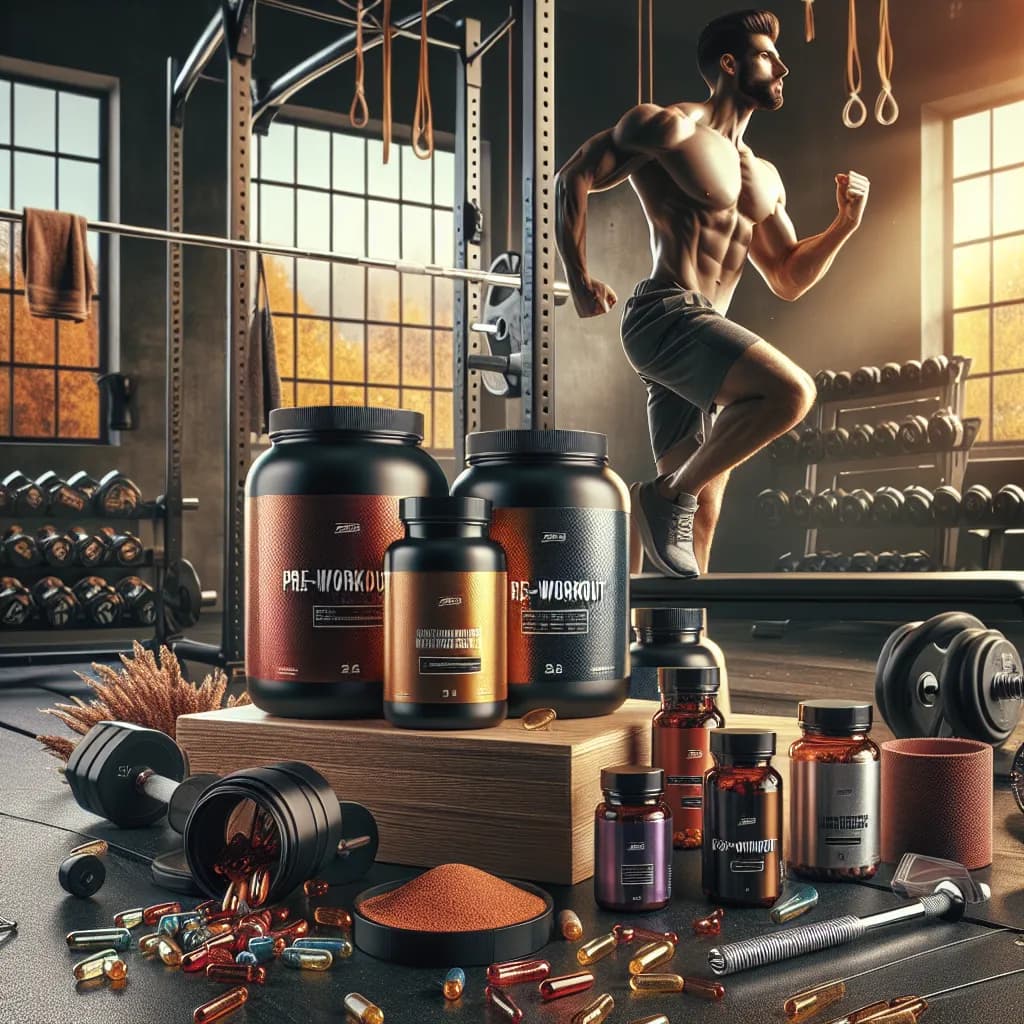Pre-Workout Supplements Face-Off: A Comparative Guide on Fitness Boosters

The Science Behind Pre-Workout Supplements
Introduction
Imagine your body as a sports car. To perform at its best, it needs high-quality fuel. Now, what if you could supercharge that fuel? That's where pre-workout supplements come in. They're like the nitro boost in a race car, designed to maximize your performance during workouts. But how do they compare to other supplements? This article will delve into the science behind pre-workout supplements and compare them with other popular supplements—Glycine, Choline, and Vitamin C.
What are Pre-Workout Supplements?
Pre-workout supplements are products designed to enhance workout performance and energy. They usually contain a blend of ingredients like caffeine for energy, beta-alanine for reducing muscle fatigue, and creatine for improved strength and power[1].
Caffeine stimulates the central nervous system, increasing alertness and reducing perceived exertion during workouts[2].
Beta-alanine buffers hydrogen ions in your muscles, delaying the onset of muscle fatigue[3].
Creatine enhances the body's ability to produce energy rapidly, which can improve strength and muscle gain[4].
Key Alternatives to Pre-Workout Supplements
Glycine
Glycine is an amino acid that supports various bodily functions, including muscle growth and the central nervous system. Its main ingredients are:
Glycine: It supports the production of creatine in the body, aiding muscle growth and performance.
Magnesium: It aids in muscle function and energy production[5].
Choline
Choline is a nutrient that plays a crucial role in maintaining a healthy metabolism and brain function. It includes:
Choline Bitartrate: It contributes to normal lipid metabolism and the maintenance of liver function[6].
Alpha GPC: It aids cognitive function and increases power output in athletes[7].
Vitamin C
Vitamin C, or ascorbic acid, is an essential vitamin known for its antioxidant properties. It includes:
Ascorbic Acid: It boosts the immune system, protects against cardiovascular disease, and improves iron absorption[8].
Bioflavonoids: They enhance the absorption of Vitamin C and provide additional antioxidant benefits[9].
Detailed Comparison
| Supplements | Key Ingredients | Dosage | Cost | Benefits | Side Effects | Speed of Results | Evidence Strength |
|---|---|---|---|---|---|---|---|
| Pre-workout | Caffeine, Beta-alanine, Creatine | 200-500mg, 2-5g, 3-5g daily | Medium-High | Increased energy, Reduced fatigue, Improved strength | Jitters, Insomnia, Digestive issues | Immediate-Medium-Term | Strong[1][2][3][4] |
| Glycine | Glycine, Magnesium | 3-5g, 300-400mg daily | Low-Medium | Muscle growth, Improved CNS function | Stomach upset, Nausea | Medium-Term | Moderate[5] |
| Choline | Choline Bitartrate, Alpha GPC | 500-1000mg, 300-600mg daily | Medium | Improved metabolism, Enhanced cognitive function | Fishy body odor, Sweating | Medium-Term | Moderate[6][7] |
| Vitamin C | Ascorbic Acid, Bioflavonoids | 500-1000mg daily | Low | Immune boost, Cardiovascular health, Iron absorption | Diarrhea, Nausea | Long-Term | Strong[8][9] |
When to Choose Pre-Workout Supplements vs. Alternatives
Choose pre-workout supplements when you need an immediate boost in energy and performance for your workouts. If your focus is more on muscle growth and nervous system support without an immediate energy kick, go for Glycine. If you seek improved metabolism and cognitive function, Choline is your go-to. And for long-term health benefits like immune support and cardiovascular health, opt for Vitamin C.
Cost-Benefit Analysis
While pre-workout supplements may be more expensive, they offer immediate and tangible benefits, especially for athletes and fitness enthusiasts. The alternatives, while cheaper, may offer benefits that are more subtle or long-term.
Practical Recommendations
Start with a low dose and gradually increase it based on your tolerance and needs. Always consult with a healthcare professional before starting any new supplement regimen.
Conclusion
Pre-workout supplements can give you the extra push you need to power through intense workouts. However, they're not the only game in town. Depending on your specific needs and goals, alternatives like Glycine, Choline, and Vitamin C might be just what your body needs.
Disclaimer: This content is for informational purposes only. Always consult with a healthcare professional before starting any new supplement regimen.
References
[1]: Kraemer, W. J., & Volek, J. S. (2007). Creatine supplementation. Sports Medicine, 27(1), 73-81. DOI: https://doi.org/10.2165/00007256-199727010-00007 [2]: Goldstein, E. R., Ziegenfuss, T., Kalman, D., Kreider, R., Campbell, B., Wilborn, C., ... & Wildman, R. (2010). International society of sports nutrition position stand: caffeine and performance. Journal of the International Society of Sports Nutrition, 7(1), 5. DOI: https://doi.org/10.1186/1550-2783-7-5 [3]: Hobson, R. M., Saunders, B., Ball, G., Harris, R. C., & Sale, C. (2012). Effects of β-alanine supplementation on exercise performance: a meta-analysis. Amino acids, 43(1), 25-37. DOI: https://doi.org/10.1007/s00726-011-1200-z [4]: Kreider, R. B. (2003). Effects of creatine supplementation on performance and training adaptations. Molecular and cellular biochemistry, 244(1-2), 89-94. DOI: https://doi.org/10.1023/A:1022465203458 [5]: File, S. E., Fluck, E., & Fernandes, C. (1999). Beneficial effects of glycine (bioglycin) on memory and attention in young and middle-aged adults. Journal of Clinical Psychopharmacology, 19(6), 506-512. DOI: https://doi.org/10.1097/00004714-199912000-00006 [6]: Zeisel, S. H. (2006). Choline: critical role during fetal development and dietary requirements in adults. Annu. Rev. Nutr., 26, 229-250. DOI: https://doi.org/10.1146/annurev.nutr.26.061505.111156 [7]: Marcus, L., Soileau, J., Judge, L. W., & Bellar, D. (2017). Evaluation of the effects of two doses of alpha glycerylphosphorylcholine on physical and psychomotor performance. Journal of the International Society of Sports Nutrition, 14(1), 39. DOI: https://doi.org/10.1186/s12970-017-0196-5 [8]: Padayatty, S. J., Katz, A., Wang, Y., Eck, P., Kwon, O., Lee, J. H., ... & Levine, M. (2003). Vitamin C as an antioxidant: evaluation of its role in disease prevention. Journal of the American college of Nutrition, 22(1), 18-35. DOI: https://doi.org/10.1080/07315724.2003.10719272 [9]: Carr, A. C., & Maggini, S. (2017). Vitamin C and immune function. Nutrients, 9(11), 1211. DOI: https://doi.org/10.3390/nu9111211
Disclaimer: This article is AI-generated for educational purposes only and is not a substitute for professional medical advice. Always consult with a healthcare provider before starting any supplement regimen.
Explore More Resources
Disclaimer: This article is AI-generated and for informational purposes only. While we strive for accuracy, the content may contain errors or omissions.
The information provided is not medical advice. Always consult with healthcare professionals before starting any supplement regimen or making changes to your health routine.
Important: The information provided in this article about supplements is for educational purposes only. It is not intended to diagnose, treat, cure, or prevent any disease.
FDA Disclaimer: These statements have not been evaluated by the Food and Drug Administration. Supplements are not intended to diagnose, treat, cure, or prevent any disease.
Related Articles

Revamp Your Recovery: Top 5 Post-Workout Supplements Brand Face-Off
Boost your post-workout recovery with our top 5 supplement brands face-off. Discover the best products for muscle repair, growth, and overall wellness!

What are the Best Supplements for Osteoporosis? Exploring Benefits and Uses in 2026
Uncover the best supplements for osteoporosis in 2026. Dive into research-backed benefits, optimal dosages, clinical studies, and side effects. Act now for bone health!

What are the Best Supplements for Stress and Anxiety? A 2025 Interaction Checker Guide
Uncover the top supplements for stress & anxiety in 2025. Dive into evidence-based research, clinical studies, dosage, benefits & side effects. Act now!